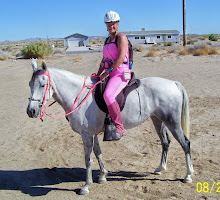We are lucky in this area to have one of the premier equine dentists available for our horses. Dr. Scott Greene is not only an equine dental specialist, he is also the developer of dental power tools for horses. Dr. Greene says a horse should have his first visit with the equine dentist before he is bitted for the first time, and yearly thereafter. A lot of people don't understand how dental health affects horses and their behavior. From my own experience, I have seen both Whisper and Andi develop aversions to being bridled, so I switched them both to hackamores knowing I needed to get them exams by the dentist. As it turns out, both Andi and Whisper had wolf teeth (1st pre-molars in humans) that needed to be extracted, and in Whisper's case, she had a blind wolf tooth that caused pain when the bit would hit it. A blind wolf tooth is quite rare and happens when the tooth does not erupt thru the gum, but grows along the jaw bone under the gum.
A horse does not chew or chomp it's food like people. In the horse, the lower jaw goes in a circular motion and has the effect of grinding the hay or grass they consume. A horse's TMJ is up near the ear, so any problems chewing their food affects the poll, which affects the entire spine, which affects the horse's behavior in every aspect of it's life. Taking Whisper as an example, she started flinging her head and got almost dangereous when I went to put her bridle on. At first, I thought her browband was a bit tight, so I got a bigger one and I also switched her to a hackamore. I knew something was hurting her, I just didn't know what it was. I have gradually, with patience and clicker training, gotten her cooperative in the bridling process with the hackamore. Dr. Greene suggested I try the bit again in a couple of weeks, but she goes so well in the hackamore, I may just stick to it.
Here is the video I compiled of the dental exams:
There is a very important lesson to be learned here: ALWAYS LISTEN TO YOUR HORSE! I did not know what Whisper's problem was, but there is almost ALWAYS a physical reason a horse does not cooperate with you. Horses are not bad on purpose, they are usually bad because they are in pain.
Subscribe to:
Post Comments (Atom)



No comments:
Post a Comment